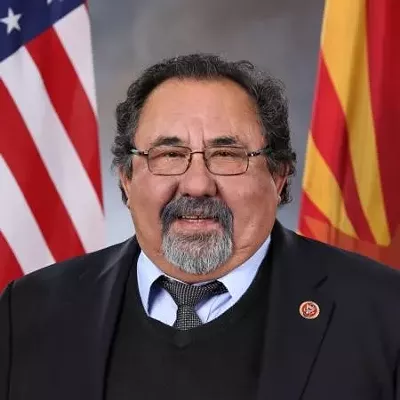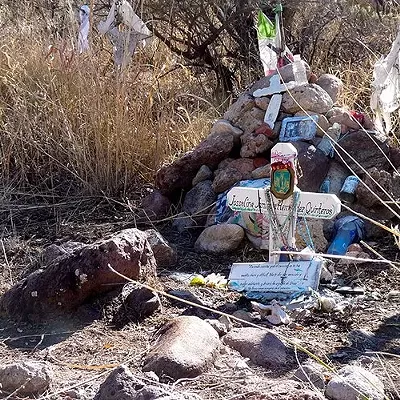Astride a podium at the U.S. Border Patrol's Yuma headquarters, Bush then unveiled his plans for cleaning up the immigration mess. More old than new, and laced with enough poison pills to fell a draft horse--including a $10,000 "fine" for destitute illegal workers--the president's broad stratagem didn't spark widespread enthusiasm. Still, the fact that he offered any plan at all has spiked hopes for immigration reform. To many observers, such repair has one last, gasping chance before the 2008 elections suck its life away.
Among the hopeful is Jennifer Allen, executive director of the Tucson-based Border Action Network. Her group pushes progressive immigration reform and beefier recognition for immigrants' rights. To put it politely, Allen isn't overwhelmed by President Bush's plan ("I think it's horrible," she says), but she does glimpse opportunity on the horizon.
She points to a bill, recently introduced in the U.S. House of Representatives, which would fashion a reasonable path toward citizenship and a guest-worker program. Introduced in March by Arizona Republican Rep. Jeff Flake and Democratic Rep. Luis Gutierrez of Illinois, the so-called STRIVE Act (Security Through Regularized Immigration and a Vibrant Economy) would allow 400,000 workers into the nation each year.
According to Allen, the STRIVE Act actually contains input from border residents. And that's directly reflected in requirements for more open communication with the federal government over enforcement impacts and civil rights. "These are things our border communities have been calling for over many years," she says.
Still, it's just a beginning. "We don't expect to get everything we want in one bill," Allen says. "We're not deluding ourselves into thinking that that one bill is going to resolve 20 years of damage, violence and abuse on the border."
But the STRIVE Act also faces tough sledding. Senate Democrats say they need at least 20 Republican votes to pass any immigration legislation. In the House, Democrats need anywhere from 40 to 80 Republican votes.
On the other hand, shifting politics and evolving alliances may loosen longstanding deadlock. In particular, powerful business groups now find themselves in agreement with immigrant-rights activists over the need for a reasonable guest-worker program.
But these budding partnerships don't shake Tom Barry's pessimism. Barry is policy director for the International Relations Center, a progressive think tank headquartered in Silver City, N.M. And like Allen, he takes particular aim at President Bush's proposal. Among other things, that plan would create a new form of document called Z visas. Lasting three years, the visas could be renewed indefinitely. But each renewal would cost $3,500--a ridiculous price tag for people illegally coming here to escape poverty.
Under the president's plan, immigrants hoping for citizenship would also be required to return to their home countries, file an application with a U.S. consulate or embassy, and then pay the fines, nearing $10,000.
The president's plan "struck me as absurd," says Barry. "It's just a political device, and it's not workable."
Nor is he hopeful that Capitol Hill will do any better. His gloomy prognosis is justified if recent efforts lend any clue. In the past few years, significant stabs at immigration legislation all ended in failure. In May, for example, a bipartisan reform bill emerged from the Senate on a 62-36 vote--and then went nowhere. Hopes were also raised by the November elections, when Congress shifted to Democratic control. But many Democrats fear political costs associated with any measure carrying a whiff of amnesty.
"Conventional wisdom has it that immigration legislation (currently) has very little chance of passing," Barry says. "There's too much liability associated with any type of program that would legalize immigrants. And I think the anti-immigration advocacy groups have been very effective in frightening politicians away from the issue, most notably John McCain.
"He's concerned about a political base that's very active. I think it's illustrative of the impact that anti-immigrant activists have had."
Those activist even have their own presidential candidate in Rep. Tom Tancredo, a Colorado Republican who's fashioned a career from bashing national immigration policies.
Speaking to the Cox News Service in March, Tancredo castigated the White House measure. "The president and his new Democratic allies in Congress," he said, "seem hell-bent on cramming this mass amnesty down the throats of the American people, whether they want it or not."
With such rhetoric, Tancredo's camp has pulled the immigration debate to the right, says Barry. For example, "They have successfully made border security the starting grounds for debate. Now progressives, liberals and conservatives are saying we need to start with making our borders secure. That's a victory for the anti-immigrant groups."
But to Barry, it's also a bogus issue "in terms of how security is typically defined. In the context of national security, there's certainly no evidence that we're facing the threat of terrorists (coming) through Mexico and into Arizona or New Mexico."
On the other hand, any true reform package must contain several key components, he says. "Immigration policy needs to set numbers on how many immigrants we can have. That's a start. We also need to look at the job market--at our anticipated demand for labor. We need to deal with this as a market issue, and as a humanitarian issue.
"Any immigration policy also needs to consider refugees. Both progressives and conservatives have left that out. But we have a responsibility to open our borders to refugees, particularly from countries we've impacted, such as Iraq."
In the meantime, he says, "We need to legalize those who are here. They are vital to our communities. But the measures that have been taken so far have terrorized those communities and polarized them."
And those enforcement measures have spiked. In fiscal year 2006, arrests by the Department of Immigration and Customs Enforcement in workplace raids rose to 4,383, triple the number for 2005.
This jump in raids--and the havoc they cause--makes reform even more pressing, say immigrant-rights activists. And according to Allen, those activists are taking their fight straight to Capitol Hill. "Immigrant communities are going to do everything in their capacity to make border reform (happen) this year," she says. "We're going to congressional hearings and meeting with key members of Congress. We're not giving up."
But just as Air Force One ascended over the patchwork fields of Yuma, those reforms may quickly disappear into partisan clouds as the 2008 election looms.










